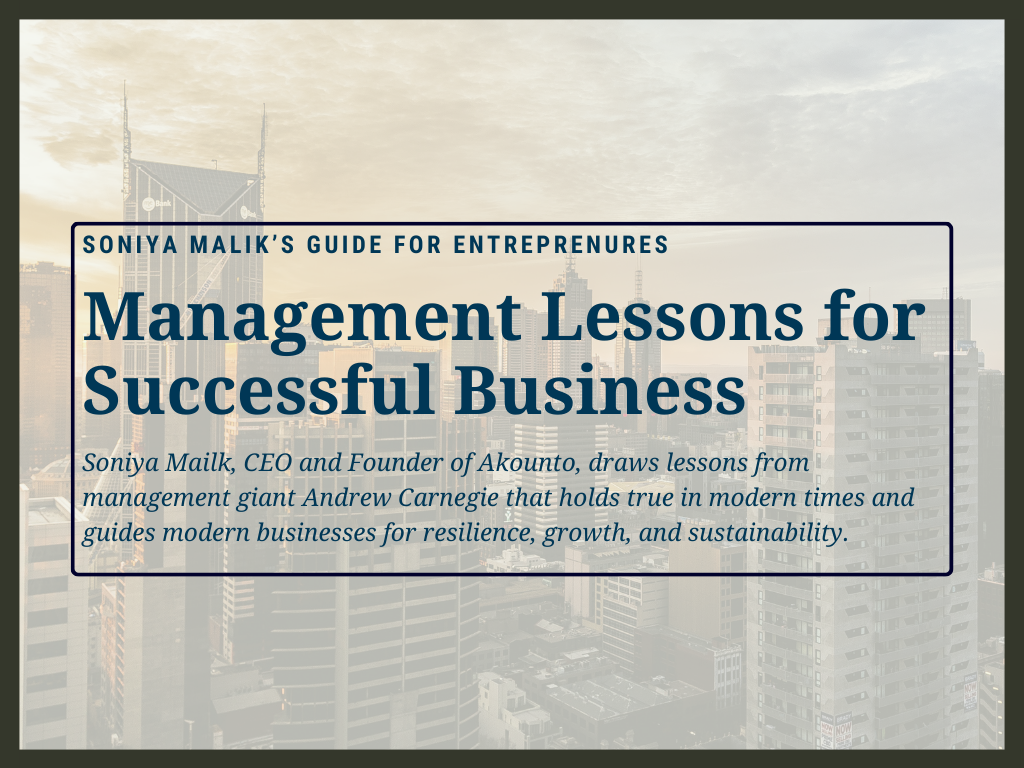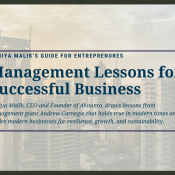Andrew Carnegie: Management Lessons for a Successful Business

Andrew Carnegie: Management Lessons for a Successful Business
During times of looming recession and economic challenges, it is often advisable to visit business fundamentals that ensure resilience and sustainability. As an entrepreneur, I, Soniya Malik, Director Akounto, have always felt and realized the need to connect with industry giants who have paved the way for modern management and offer rock-solid guidance to all entrepreneurs. One such industry giant and visionary is Andrew Carnegie.
When AI is changing the landscape of the industry, skills, management, etc., disruption in the market can only be met by innovation and adaptability, which Andrew Carnegie emphasized in managing and handling growing businesses. In Akounto (my company), we made flexible workflows that can adapt to changing needs, flat hierarchies for faster information exchange, management accessibility, and harnessing technology for business management.
Join me as I share how Andrew Carnegie's management lessons have shaped my approach to leadership and decision-making.
1. Visionary Leadership
Andrew Carnegie believed that leaders should always think of new ways to improve their businesses and make a positive impact on the world. He was a pioneer in steel, using new ideas and smart business tactics to build a huge empire that ruled the global steel market. His visionary leadership lessons have inspired me to try new things and use new technology to improve Akounto.
As an entrepreneur, the role of having a long-term vision can be seen in the case of Elon Musk, the CEO of SpaceX and Tesla. Having a vision is like having a map where you want to navigate to, and as a leader, it inspires me as I lead Akounto into the future. Even bold goals and visions of a far-off future, like colonizing Mars and revolutionizing transportation with electric vehicles, can be met, but for it you must understand the power of dreaming big and pushing your boundaries.
I have also incorporated this lesson into Akounto by providing end-to-end accounting solutions that help businesses integrate their finances better. At Akounto, we've developed accounting software that's user-friendly, even for people without an accounting background, and we continuously aim to make financial management easy for everyone.
Similarly, leaders can implement a culture of innovation by encouraging creative thinking and risk-taking. Staying updated on technology helps businesses stay ahead while being open to new ideas fosters collaboration and growth.
2. Commitment towards Learning
Andrew Carnegie emphasized the importance of lifelong learning for leaders, advocating continuous improvement to drive business success and positive change in the world. He was a businessman who valued education and believed in its transformative power to uplift individuals and communication.
Satya Nadella, the CEO of Microsoft, is one of the leaders in this era who is renowned for prioritizing learning and empowering employees to pursue their professional growth.
At Akounto, I firmly believe in the importance of continuous learning. As the company's leader, I make it a priority to stay updated on industry trends and emerging technologies. I actively seek out opportunities to expand my knowledge and skills, ensuring that I stay caught up in the fast-paced industry.
Leaders can execute the lesson of continuous learning by prioritizing professional development for themselves and their teams, fostering a culture of curiosity and growth, and providing resources and support for ongoing learning opportunities.
3. Only Produce the Best
Andrew Carnegie realized that a large component of success was hard work. This meant complete dedication to the project at hand. He believed that business can work when you ensure excellence in your products or services, prioritize customer satisfaction, foster a positive work environment, and manage competition effectively.
Tim Cook, Apple's CEO, represents Andrew Carnegie's lesson of hard work in his business. His dedication to excellence has moved Apple to the forefront of the technology industry. By prioritizing business product quality, customer satisfaction, and innovation, he demonstrates the importance of unwavering commitment to achieving success.
As I lead Akounto, I understand the importance of Andrew Carnegie's lesson on hard work. It's not just about putting in the hours; it's about complete dedication to our mission. We prioritize excellence in our product, customer satisfaction, and fostering a positive work culture.
Leaders can incorporate the lesson of hard work by setting a strong example through their own dedication and work ethic. They should prioritize excellence in tier products or services, foster a positive and productive work environment, prioritize customer satisfaction, effectively manage competition, and continuously seek out new opportunities for growth and improvement.
4. Focus on One Basket
Andrew Carnegie understood that hard work in business requires complete focus, unwavering dedication to growth and development, and meticulous attention to quality control. He believed that there should be no plan B, as it only serves as a distraction from plan A.
Jeff Bezos, the CEO of Amazon, built Amazon from a small online bookstore into one of the largest and most influential companies in the world through his relentless dedication to customer satisfaction, innovation, and long-term vision. If he was not completely invested in his business at that time, he wouldn't have achieved what he has today.
I prioritize aligning our efforts to ensure Akounto reaches the right audience and provides valuable solutions. By dedicating myself to Akounto's growth and ensuring it meets the needs of our users, I'm confident that we can achieve our goal and make a meaningful impact in the industry.
I want to suggest that leaders prioritize and be completely focused on setting clear goals, organizing tasks effectively, and forestalling a culture of dedication within their teams.
5. Know What You Bring to the Table.
Andrew Carnegie realized the importance of understanding what he needed to know about his business and what he did not need to know. He famously stated, I did not understand steam machinery, but I tried to understand that much more complicated piece of mechanism—man. With this statement, he meant that by focusing on understanding people and using their talents, entrepreneurs can collect the necessary resources to create great products.
Here, I want to mention Sara Blakely, founder of Spanx, who exemplifies Andrew Carnegie's lesson of understanding what is essential to know about a business. She focused on her strengths in marketing and sales, delegating tasks outside her expertise to others. This strategy has allowed her to build a successful business that revolutionized the shapewear industry.
I prioritize grasping the core aspects while entrusting specialized tasks to my capable team. Recognizing my strengths in strategic planning and leadership, I delegate technical aspects to experts.
Leaders can incorporate this lesson by first identifying their strengths and weaknesses and the core aspects of their business that require expertise. They should then delegate tasks that fall outside their expertise to qualified team members who excel in those areas.
Conclusion
When the times are going haywire, and we are talking about disruptions, layoffs, recessions, etc.. It is this timeless wisdom that keeps on guiding us when all the prevalent theories, practices, and principles are failing. The management giants like Andrew Carnegie and others offer us management advice that is still applicable today, be it an entrepreneur, a fresher, an executive, a manager, or any other cog in our economic system. Principles of economics and management lie on the strong base of fundamentals as well emphasized by Andrew Carnegie.




